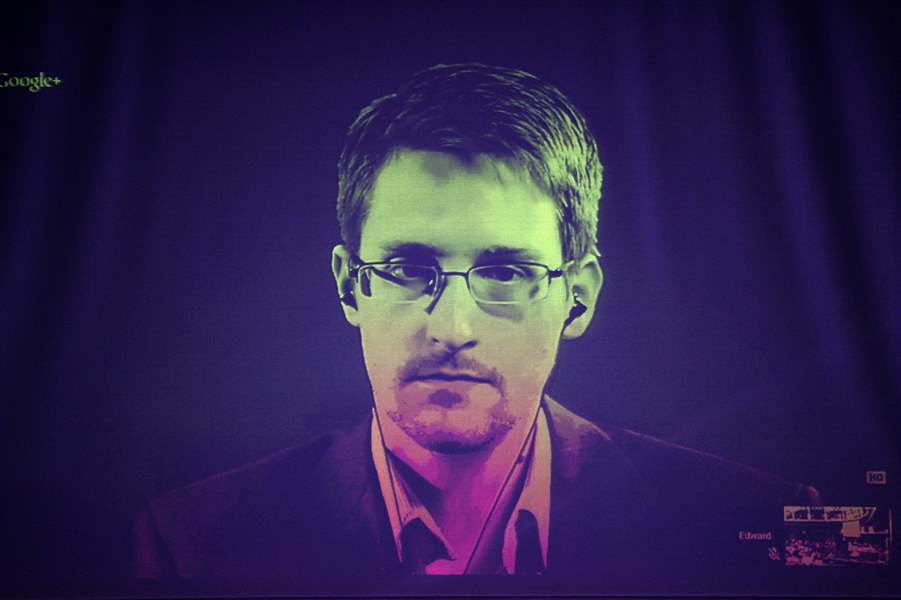
A challenge to President Trump
6/8/2018
Five years ago this month, Edward Snowden released hundreds of thousands of classified documents about the National Security Agency's warrantless surveillance of U.S. citizens and citizens around the world.
FREDERICK FLORIN/AFP/Getty Images

Will Tomer
President Donald Trump expresses his opinion about a number of topics on Twitter, but one to which he returns frequently is government surveillance. He claims that the federal government conducted an unethical and potentially illegal surveillance operation of his presidential campaign in 2016, at the direction of the Obama administration.
As is often the case nowadays, many commentators question the validity of Mr. Trump’s claims. But based on what is known about our government’s surveillance programs, the President’s charges aren’t so far fetched. There is, moreover, the possibility that in this instance, Mr. Trump is right.
After all, it is a matter of published record that the U.S. government — first under President George W. Bush and then under President Barack Obama — used warrantless surveillance programs to spy on U.S. citizens. Documents leaked in 2013 revealed the National Security Agency’s attitude on this matter: “Collect it all.” So there is indeed reason to believe the President’s claims about the surveillance of his campaign are plausible.
Many will doubt anything Mr. Trump says. This is why his interests can be served by acting on a challenge well within the scope of the powers of the presidency.
The challenge to Mr. Trump is this: End the U.S. government’s warrantless surveillance programs and pardon whistleblowers like Edward Snowden, who have exposed such programs.
When the program of warrantless surveillance initiated by George W. Bush’s administration was revealed in 2005, it was mainly liberals who expressed their outrage. How could a president take such excessive action?, they’d ask. Surely this must be illegal.
The Bush administration, in turn, claimed the programs were essential to national security. They claimed that the surveillance program helped to prevent additional terrorist attacks, although the programs were later described, in a 2009 report produced the inspector generals of five federal agencies, as ineffective.
A young senator from Illinois, Barack Obama, made the following comment in 2006: “We need to find a way forward to make sure that we can stop terrorists while protecting the privacy, and liberty, of innocent Americans. ... As a nation we have to find the right balance between privacy and security, between executive authority to face threats and uncontrolled power. What protects us, and what distinguishes us, are the procedures we put in place to protect that balance, namely judicial warrants and congressional review.”
Five years ago, when Edward Snowden’s leaks first came to light, Mr. Obama, by then on his second term as president, had not only allowed warrantless surveillance to continue, he had expanded the programs.
What’s more, Mr. Obama and others within his administration lied about the nature of the programs.
Several months before Mr. Snowden’s revelations, James Clapper, Mr. Obama’s director of national intelligence, told Congress, under oath, that the NSA did not collect data about U.S. citizens. (Mr. Clapper claimed to have “forgotten” about the programs that surveilled Americans, and eluded a perjury charge.)
In the immediate aftermath of Mr. Snowden’s leaks, Mr. Obama claimed that the NSA was “transparent,” and that it did not collect data from American citizens.
When both of these claims turned out to be false — as proven by Mr. Snowden’s leaks — it was conservatives who were up in arms. Mr. Obama was tearing up the Constitution, they said. There must be an investigation.
Democrats lined up behind Mr. Obama. He was the constitutional law scholar with a Nobel Peace Prize, and they believed that he knew what he was doing.
And so we come to Mr. Trump, who has fumed about the unchecked power of the intelligence community, while declining to curtail programs like those based on warrantless surveillance.
Warrantless surveillance should not be a partisan issue. It should be seen for what it is: a clear violation of the civil liberties of Americans. It should not matter if a Republican, Democrat, or unelected bureaucrat is in charge of the operation. It should be viewed as an act that is wrong and illegal because it violates the rights of U.S. citizens.
Mr. Trump has the opportunity to act as a champion of civil liberties by ending the warrantless surveillance program and pardoning Mr. Snowden. He has the chance to transform his complaints into an important change in policy.
Such a change would reduce the reach of the U.S. intelligence agencies, to be sure, but it would also demonstrate that Mr. Trump’s concern about the violation of civil liberties is not limited to his own.
RELATED: House Dems show true colors with government surveillance vote
The odds of Mr. Trump doing either of these things are extraordinarily low. And perhaps that’s the more important point: Washington, the swamp Mr. Trump promised to drain, is full of hypocrites.
The indignation of conservatives furious that the Obama administration would dare to spy on the Trump campaign would have been useful when the Bush administration implemented illegal surveillance programs in 2001. The calls for accountability and transparency initiated by many liberals during the Bush administration would have been helpful during the Obama years and they would be welcome now.
Instead, our solons, Democrats and Republicans alike, continue to rubber-stamp these programs, mostly recently in January of this year, when Congress reauthorized warrantless surveillance under Section 702 of 2008 FISA Amendments Act for another six years. It was a move Mr. Trump ultimately supported, though he had noted that the law had been the basis for placing his campaign under surveillance. We don’t know why Mr. Trump decided to support the law.
Shortly after that vote, the Trump administration asked for $81.8 billion in funding for the “black budget” that bankrolls U.S. intelligence agencies and operations.
It was not the action of a man concerned with the expansive powers of the federal surveillance apparatus.
As unpredictable as Mr. Trump is, it is unlikely that he will end warrantless surveillance or pardon the whistleblowers who have made us aware of these programs, more or less in lockstep with George W. Bush, Barack Obama, and the legion of federal lawmakers who regularly vow to protect the rights of U.S. citizens and just as regularly break those promises.
Our elected representatives seem to care about illegal surveillance only when the programs are exposed to public scrutiny and criticism, or when they become the targets of surveillance.
All the while, the concerns of the average American citizen — whose emails, phone calls, text messages, and social media postings are swept up in a dragnet program operated by our federal government — are unexpressed and asserted.
Contact Will Tomer at wtomer@theblade.com, 419-724-6404, or on Twitter @WillTomer.